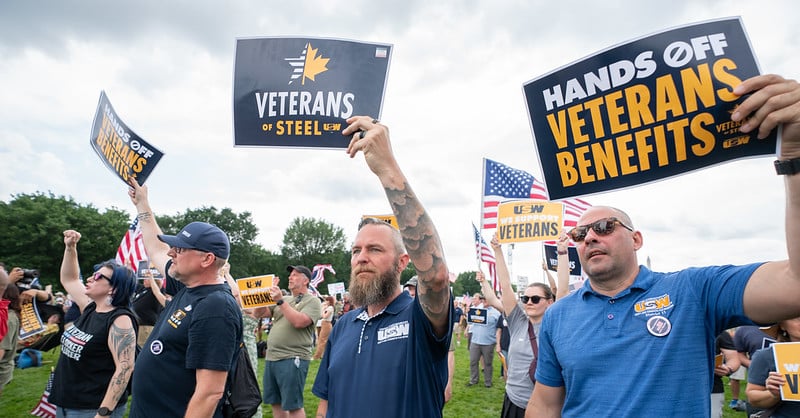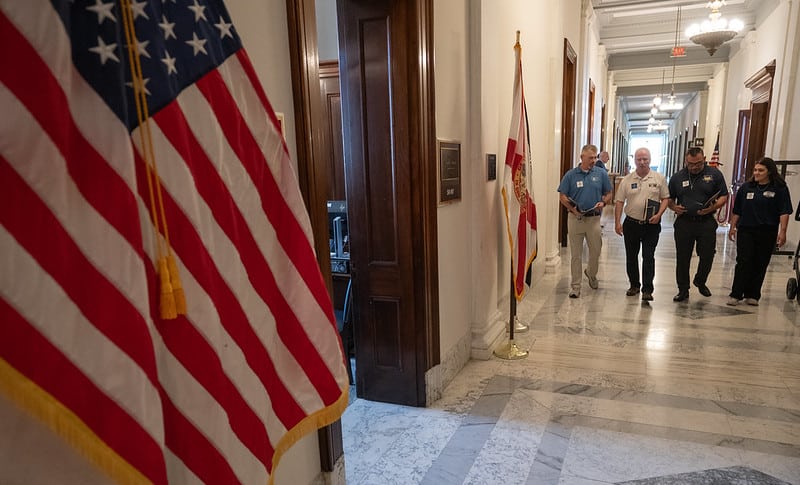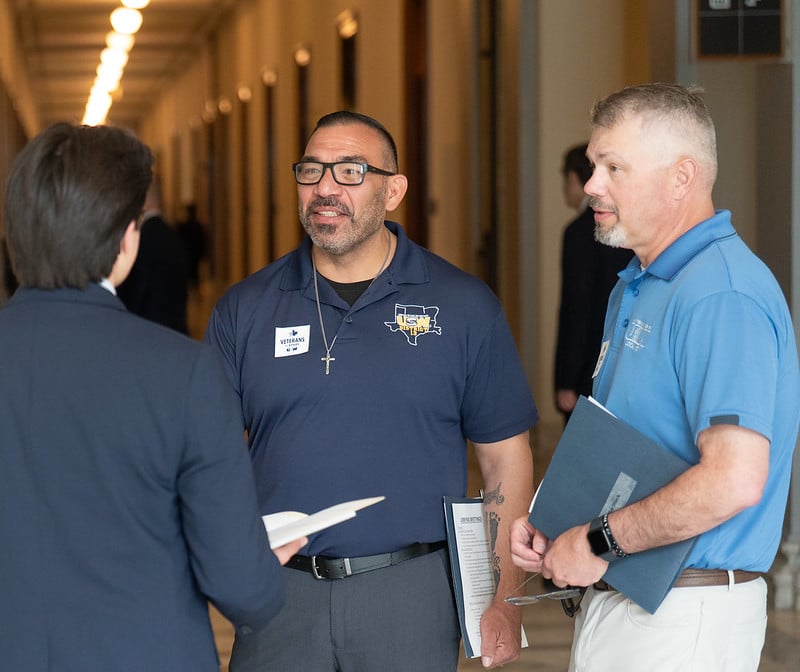Defending Our Defenders: Union Veterans Demand Action in D.C.

More than 40 Veterans of Steel activists traveled to Washington, D.C., on June 5th and 6th to lobby and rally on behalf of military veterans and to pressure Congress to protect those who protected their country.
John Stevens of Local 341 was one of them. A U.S. army veteran himself, Stevens jumped on the chance to speak with officials about the Saving Veterans’ Lives Act (H.R. 1987). The bill would direct Veterans Affairs (VA) to establish a program that provides free firearm lockboxes to veterans, along with educational materials about secure weapon storage.
For Stevens, this legislation isn’t political—it’s personal. His older brother also served in the military and struggled with his mental health for years after multiple deployments in the Middle East.
“He was dealing with the VA for a long time, and they kept pushing his treatment back,” said Stevens. “He ended up taking his own life in 2017 before they could get him in.”
Since President Trump was inaugurated, his administration has been shedding employees of Veterans Affairs, which provides health care to roughly 9 million veterans. VA Secretary Doug Collins has proposed cutting around 80,000 employees—about 15 percent—from the agency’s work force, of which 25 percent are veterans.
Stevens fears that gutting this agency, which already experiences bottlenecks, will worsen conditions for those suffering with mental health issues.
“You can’t postpone things like this,” he said. “It has to happen immediately.”

Reversing the Rollback
The group of activists also spoke with their elected officials about the Protect America’s Workforce Act (H.R. 2550), which, like H.R. 1987, has bipartisan support. It aims to reverse Trump’s executive order issued in March that stripped collective bargaining rights from 1.5 million federal workers.
These rights are protected under Title 5 of the U.S. Code, which includes vital workplace protections such as fair pay, equitable treatment, protection against workplace retaliation, whistleblower protections, health and safety standards, and due process in grievance and disciplinary matters.
Federal workers—roughly one-third of whom are veterans—already surrender many rights that private-sector employees enjoy, including the ability to negotiate wages and benefits and the fundamental right to strike.
A Powerful Reminder
The following day, the USW activists joined thousands of other union members, veterans and allies for a rally on the National Mall organized by the Union Veterans Council.
“This is about protecting the promises we made to our veterans,” said Kate Logan, an Iraq War veteran and immigrant who emceed the rally, which also featured an explosive performance by the American Celtic punk band Dropkick Murphys.
The event was made all the more powerful by being held on D-Day, commonly known as the day the Western Allied effort landed in France to liberate western Europe from Nazi Germany.
Speakers addressed the duty veterans and active military members have to not only honor the memory of those lost during that historic battle for freedom abroad, but to continue the fight here at home.
“Our mission has not changed,” said Everett Kelly, national president of the American Federation of Government Employees (AFGE), the union currently fighting like hell to reinstate bargaining rights for their workers. Kelly is also a veteran himself. “Our mission is to protect and serve, to support and defend, and that has not changed.”
He’s also part of the coalition working to protect the VA as the current administration has already cut many key benefits and programs, including a new mortgage-rescue program that so far has helped about 20,000 veterans avoid foreclosure and keep their homes.
“What has changed, however, is the government’s promise to be there for us when we get home,” said Kelly.

The Fight Continues
Will Attig served alongside Logan as a rally emcee and works full-time as the executive director of the Union Veterans Council. Attig knows personally how hard the transition is from military to civilian life, which is why he fights just as hard now to help his fellow veterans. It’s also why protecting and enhancing benefits for veterans is so necessary.
“When I left the military, I brought home a pretty big bag of issues and was trying, like many veterans, to find work during the recession,” said Attig. “I was able to find a job through a welding program that allowed me to become a union pipefitter, and I knew I had to find a way to help others get that same kind of opportunity.”
Stevens also knows how important it is for unions to support their members who have served through programs like Veterans of Steel.
“It’s a voice for veterans and helps push important legislation,” said Stevens. “There’s also the camaraderie aspect that you can’t find a whole lot of outside the military.”
To learn more about Veterans of Steel, visit usw.to/vetsofsteel.
By clicking Sign Up you're confirming that you agree with our Terms and Conditions.
Recent News Articles
Want to Learn More?
See how the USW is making a real difference in our communities and our workplaces.